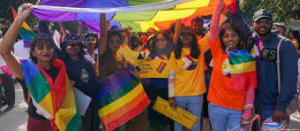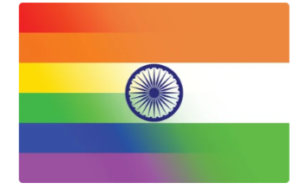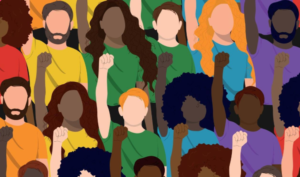
The Hesitance of the Indian Society to Accept the LGBTQIA Community.

Introduction
India, a country renowned for its diverse and rich cultural past, has made great advancements in many areas of societal development.
However, Indian society has demonstrated hesitation and opposition when it comes to accepting the LGBTQIA (Lesbian, Gay, Bisexual, Transgender, Queer, Intersex, Asexual) population.
Deep-seated societal, cultural, and religious convictions that have marginalized sexual and gender minorities are the cause of this reluctance. Despite the outstanding progress made in recent years, India’s LGBTQIA community still has a long way to go before it is fully accepted and inclusive.

Historical Background
It is essential to look at India’s historical setting in order to comprehend the resistance to the LGBTQIA population. Traditional social systems frequently see homosexuality and non-binary gender identities as taboo or immoral, motivated by conservative ideals and religious ideas. By enacting Section 377, a regulation that criminalized same-sex partnerships, British colonial power served to further cement these stereotypes.
Effects of Section 377 and recent legal changes
The fact that Section 377 was in place for more than 150 years has influenced society’s mistrust of the LGBTQIA population. The law encouraged discrimination, stigma, and harassment in addition to criminalizing same-sex partnerships.
However, the Indian Supreme Court struck down Section 377 in a momentous decision in 2018 and decriminalized consensual same-sex partnerships. This landmark choice was a crucial step in removing the legal restrictions on LGBTQIA rights. The LGBTQIA community was still met with societal attitudes and reluctance despite the decriminalization. To confront deeply rooted biases and prejudices that have persisted for years will take time.

Religious and cultural influences
Indian society, which is known for its rich mix of cultures and religions, frequently struggles with the tension between tradition and modernity. It might be difficult for some people to accept non-heterosexual orientations and non-binary gender identities because many cultural standards and religious beliefs are firmly entrenched in heteronormativity and binary gender roles.
The idea of family honour and the need to meet social norms are some factors that cause people to be wary of the LGBTQIA group. Many families worry that accepting a non-heterosexual family member will damage their reputation and cause them to be shunned and excluded from society.
Social awareness and shifting paradigms
Despite these obstacles, there has been a subtle change in how society views the LGBTQIA population. When it comes to dispelling myths and promoting understanding, increased media exposure, awareness campaigns, and the persistent work of LGBTQIA activists and allies have all been crucial.
One of India’s most significant cultural outlets, Indian cinema, has begun to explore LGBTQIA issues, question conventional narratives, and advocate for inclusivity.
Movies like as “Aligarh,” “Kapoor & Sons,” and “Ek Ladki Ko Dekha Toh Aisa Laga” have contributed to igniting discussions and bringing attention to the hardships and aspirations of the LGBTQIA community.
Institutional Assistance and Legal Defence
The Indian government has launched a number of measures to promote acceptance of the LGBTQIA community. Through the recognition of their rights and addressing the discrimination they experience, the Transgender Persons (Protection of Rights) Act, 2019, strives to defend and empower transgender people. Furthermore, groups like the National Human Rights Commission have been crucial in raising awareness, holding workshops, and fighting for the rights of LGBTQIA people.
One of India’s most significant cultural outlets, Indian cinema, has begun to explore LGBTQIA issues, question conventional narratives, and advocate for inclusivity. Movies like as “Aligarh,” “Kapoor & Sons,” and “Ek Ladki Ko Dekha Toh Aisa Laga” have contributed to igniting discussions and bringing attention to the hardships and aspirations of the LGBTQIA community.

The Importance of Education and Awareness in Fostering LGBTQIA Community Acceptance
In order to eliminate hesitation and promote acceptance of the LGBTQIA population in Indian society, education and knowledge are crucial foundations. Educational institutions and awareness campaigns play a critical role in influencing attitudes and dismantling barriers by encouraging inclusivity, dispelling stereotypes, and cultivating understanding.
Curricula that are inclusive of LGBTQIA people: Including LGBTQIA-inclusive curricula in schools and institutions is a crucial first step in fostering acceptance and understanding. Educational institutions can offer a more accurate and complete understanding of human sexuality and gender identities by incorporating a variety of perspectives and experiences in textbooks, lessons, and conversations.
This can help dispel misconceptions, combat stereotypes, and provide safe settings where LGBTQIA kids can flourish without having to worry about prejudice. In Indian society, hesitance towards the LGBTQIA group can be overcome with the use of education and awareness campaigns.
Educational institutions can help to create a more welcoming and inclusive society by incorporating inclusive curricula, running sensitization campaigns, offering teacher training, establishing support networks, involving parents, and increasing media literacy.
By making these efforts, we may help the next generation develop a more nuanced knowledge of the various sexual orientations and gender identities, which will make society more compassionate and equitable for all.
Conclusion
While prejudice against the LGBTQIA community continues to be a problem in Indian society, there is yet hope for advancement. Acceptance and inclusivity are beginning to gain ground as a result of legal changes, societal transformations, and rising awareness.
Deeply ingrained biases must be overcome through collaborative action, which includes curricular changes, media representation, and the unshakable dedication of people, families, and communities. Indian society can only genuinely become a place where every person feels secure, respected, and appreciated, regardless of their sexual orientation or gender identity, by embracing diversity and upholding the rights and dignity of all people.







